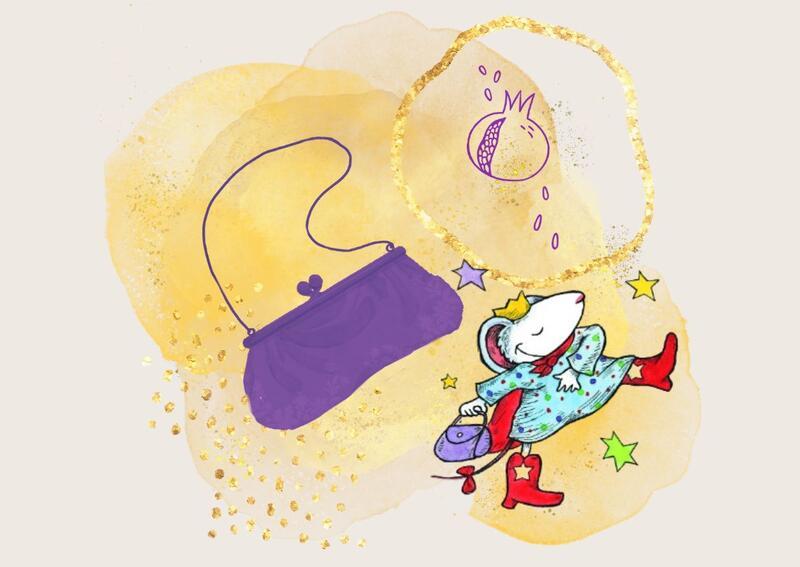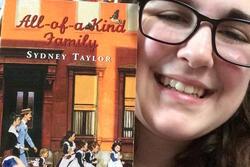Lilly’s Purple Plastic Purse Taught Me the Importance of Teshuvah
I argue. I slam my bedroom door. I bury my face in my hands out of frustration. It’s hard to admit, but I’ve always been terrible at apologizing. The two words that should slip out of my lips with ease, I’m sorry, just seem to get stuck on their way out. It’s not that I don't want to make amends, or that I’ve got some evil spirit inside of me that sucks up all my empathy. To me, apologizing, even when I know I’ve made a mistake, has always felt like an acceptance of defeat.
While my stubbornness has made it difficult for me to navigate some situations, it has also made me more appreciative of the times I am able to apologize, including on Yom Kippur, the Jewish day of atonement. Each year around the High Holidays, my family makes an effort to set aside some time to make heartfelt, sincere apologies to one another for anything that happened during the year that may have hurt others’ feelings or made them feel anything but loved and respected. The care and consideration that my family puts into these moments have helped me understand the transformative value of atoning for your sins, no matter their gravity, by confronting your mistakes face-to-face.
Aside from my family’s intimate apologies, I’ve also learned the value of righting my wrongs through other traditions kept during the High Holidays. On Rosh Hashanah, I watch as the year’s worries float away as breadcrumbs float down an icy stream of water during tashlich. Each piece of bread that I rip is a reminder that holding on to mistakes from the past will not prevent them from happening again in the future. On Yom Kippur, I fast to keep myself accountable in terms of my sins, but also to start the next year on a clean slate. Through celebrating the High Holidays surrounded by loved ones, enveloped in the comforting arms of my synagogue’s congregation, I have learned what it means to make peace with those I’ve wronged, including myself. But when I thought about where I learned how to make amends, I realized it wasn't just from Hebrew school or from my family. It was, instead, one of my most-read books from childhood: Kevin Henkes’ Lilly’s Purple Plastic Purse.
Lilly’s Purple Plastic Purse tells the story of a mouse named Lilly. There’s one thing that’s made clear about Lilly from the start of the story; she loves school. She adores the pointy pencils, the school lunches, and, most of all, her teacher, Mr. Slinger, who “was as sharp as a tack…[and] wore a different colored tie for each day of the week.” Lilly admires Mr. Singer with such tenacity that she decides that she, too, would like to be a teacher (along with being a dancer, surgeon, scuba diver, and pilot, that is).
After a shopping spree with her grandmother, Lilly goes to school the next day with a brand new pair of “movie star sunglasses,” three sparkling quarters, and a purple plastic purse that plays music when opened. Enthralled by her new belongings, Lilly is so desperate to show off to her class that she interrupts Mr. Slinger’s lesson. A frustrated Mr. Slinger takes Lilly’s things for the day, prompting a furious Lilly to draw a libelous picture of Mr. Slinger, which she delivers to him. To Lilly’s surprise, when she opens her purse on her way home, she finds a letter from Mr. Slinger: “Today was a difficult day. Tomorrow will be better.” An all-consuming queasiness fills Lilly’s stomach, and she runs home to come up with a solution. A new drawing of Mr. Slinger is made, and Lilly even writes an apology letter to her teacher. The next day at school, Lilly presents her apology to Mr. Slinger, who eventually wholeheartedly accepts.
I don’t think I realized just how much I related to Lilly until rereading this story all these years later. Aside from having similarly bizarre career aspirations (I dreamt of being either a hairdresser or the President of the United States– or both!), Lilly is, like me, sometimes too consumed by her own interests to realize that she had wronged someone. I’ve often felt that my inability to apologize was rooted in the fact that, in my mind, I hadn’t done anything wrong. But, just like Lilly, my conscience is always there for a rude – yet necessary – awakening. The guilt that tightens my stomach, makes me want to argue, to slam my bedroom door, and to bury my face in my hands is there because, deep down, I know that I am in the wrong. I just can’t bring myself to say it. And, just like Lilly, this regret eventually helps me to make amends.
Lilly’s ability to recognize her mistakes, own up to them, and then work to make things right has given a new meaning to the term teshuvah for me. Teshuvah, directly translated as “returning,” is the Jewish value of repentance for one’s sins – literally, a return to the path of righteousness. The process of teshuvah, which most people most consciously practice during the High Holidays, includes three stages, which were originally laid out by the philosopher Maimonides: confession, regret, and a vow not to repeat the misdeed. In her apology to Mr. Slinger, Lilly goes through these very stages of Teshuvah, and is successfully forgiven.
While I can’t be sure if Lilly ever repeated her misdeeds, her commitment to completing the steps of teshuvah inspires me to reflect on the ways I go about correcting my own wrongdoings. If you put in the necessary effort, and are able to step out of a cycle of stubbornness, teshuvah can be truly restorative. At least, it was for me and one small mouse with a very purple plastic purse.
This piece was written as part of JWA’s Rising Voices Fellowship.







